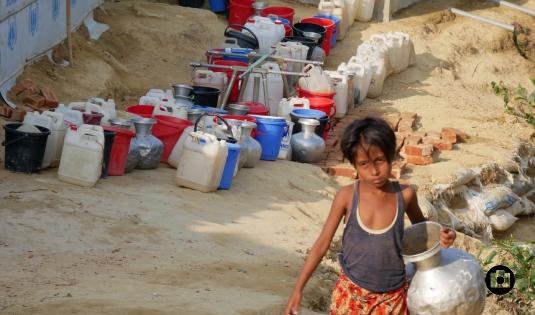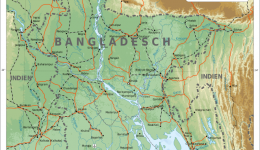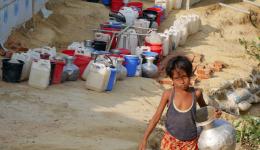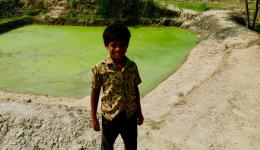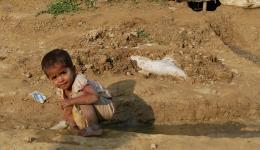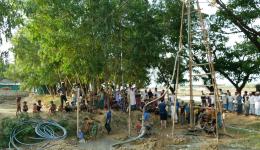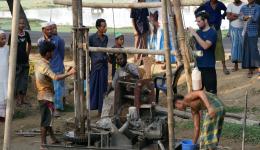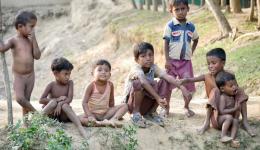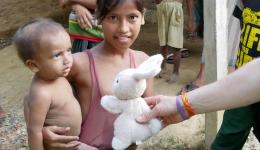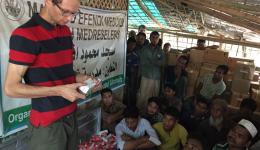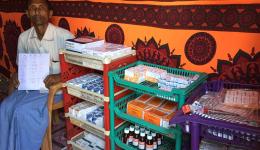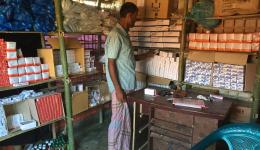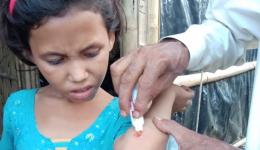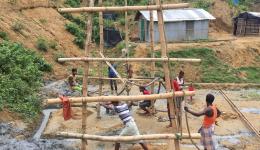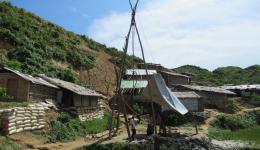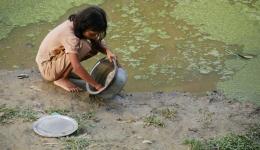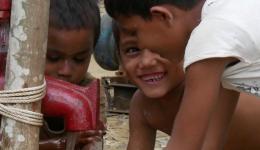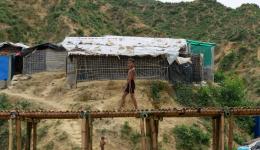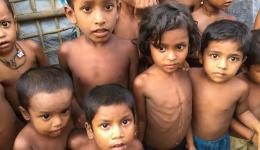Registered Nonprofit
Association for the Support
of Children and Needy
People Around the World
Unterstützung
Support of Rohingya refugees in Bangladesh
Sun, Jun 10, 2018 - 9:45am, written by Alexandra, published by Frank
Setting up of medical care stations - six wells completed
After packaging the medicine for seven districts in the Rohingya camps, the area leaders receive a first aid course by Michael.
The pharmacist who had sold the medicine is also there to help and will continue to be available and answer questions. In addition, Hashim, our constant companion, carefully writes down all information.
People are very eager to learn and quickly absorb the knowledge hoping to be able to help in the future many children and sick persons.In the following two days there are many visitors in the small bamboo huts, which serve as "medical care stations". The leaders have already recorded several visits to patients and the dispensing of medicine for fever, diarrhea, colds, asthma, infectious skin diseases and so on.
Meanwhile, work on the water wells continued in parallel.
It was not easy to find enough companies to have the drilling of seven wells take place simultaneously. In some places it was easier to get to groundwater quickly, in other places drilling had to be abandoned after a depth of about one hundred meters, and resumed elsewhere! Finally, the drillings were successful in six places!
THANKS to ALL friends at home who have been sharing and supporting our activity.
For more information see the photo album.
Furthermore, a film about this journey will follow soon.
Sun, Jun 3, 2018 - 10:41pm, written by Alexandra, published by Frank
Water already found in five places!
As described below, wells are being drilled in seven places. By tonight, water has already been found in five places - a great success!
Thank you for your kind thoughts and moral support!
Alexandra and Florian will stay three days more before returning home. We hope that everything will be ready in time...
Michael and Jürgen arrived home safely last night.
Fri, Jun 1st, 2018 - 10.31, written by Alexandra, published by Frank
Short interim report
Meanwhile, a week has passed and the team has spent every day in the camp. As described in the last report, the biggest problems were quickly determined. Drilling for a total of seven wells has been going on for several days now and is making good progress. The inhabitants are also helped with medical supply stations, which have already been set up.
Here on our homepage you will find some new photos. More pictures and further reports will follow.
Florian and Alexandra will stay on site another week or so to continue the work and hopefully complete everything successfully.
Michael and Jürgen went on their two-day journey home today...
Fri, May 25, 2018 - 10:30pm, written by Alexandra, Michael and Jürgen, published by Frank
Short report
The drive from the accommodation in Cox Bazar to the camps takes two hours. The path leads for miles along refugee camps, currently the largest in the world. At the very end of the route there is a camp of about 16,000 people who have not yet been officially registered and have therefore received very little international aid.
The situation is fatal. Food is basically scarce. For drinking water, some people have to walk a kilometer and to queue for hours until they can fill the containers they have brought with them.
The water for the showers as well as for washing the clothes is brown and foul-smelling. A man says: "Sometimes we don't have enough drinking water, then we have to drink the bad water from these ponds. It makes us sick and especially our children get sick. Some people are vomiting afterwards."
On the morning of May 25, it rains heavily. While the day before some children were sitting in a hut supposed to represent a kind of ‘school’, today the inside of the hut is knee-deep under water.
The rain has just started these days. The monsoon season is forthcoming.Then even more will sink into the mire. Toilets will be overflowing and contaminating the drinking water.
The huge camp with about 7000 families is divided into seven sectors. Michael, Jürgen and Alexandra meet with the heads of the unregistered Rohingyas. We discuss on how to best help the people. Besides water and medicine, food is most urgently needed. Clothes would also be necessary, because many of the children we meet are naked.
It is decided to first drill deep wells to provide more "water outlets" for clean drinking water.
In addition, free medical dispensaries will be set up to provide the most necessary medicines for diarrhea, fever, asthma, cough and rashes. In addition, bandages and disinfectants are required.
It's touching to see people here in this state. The hardest thing to bear for them is the uncertainty. Neither in Myanmar nor in Bangladesh the Rohingya people are welcome.
THANK YOU for your kind comments on Facebook and Whats App and your valuable support! It encourages our team and especially the people who will be supported in the following days, weeks and months by the work of friends help friends.
Link to the 2nd video - hier klicken
Fri. May 25,.2018 - 12:45, written by Frank, published by Frank
Arrival, on-site exploration and first impressions
On Monday, Michael, Jürgen and Alexandra left for Bangladesh. After two days of travel and a domestic flight they have reached their destination in Bangladesh – the region at the border to Myanmar. Here are the camps of fled Rohingya, who are classified by the United Nations as "the most persecuted minority in the world" (see Wikipedia).
After a first exploration tour the three have already made a video – link to the 1st video - hier klicken -
Until Florian’s arrival on Saturday, the necessary support will be determined and organized on site...
For background information: Rohingya
Source: WIKIPEDIA
Bangladesh (Bengali বাংলাদেশ Bāṃlādeś [ˈbaŋlaˌd̪eʃ]; composed of bangla /Bengali‘ und desch ‚country‘) is a state in South_Asia. To the south, it borders the Bay_of_Bengal, Myanmar to the southeast and is otherwise surrounded by the Indian states of Meghalaya, Tripura, West Bengal, Mizoram und Assam. With about 165 million inhabitants (2017) on an area of 147,570 km² it ranks eighth among the world's largest states in terms of population worldstats.com/stats and seventh in terms of Population_density. In terms of area, however, it ranks 92nd among the medium sized states. The capital Dhaka is one of the fastest growing Megacity in the world. Chittagong and Khulna are further cities with over a million inhabitants.
Bangladesh occupies the eastern part of the historic region of Bengal, which in 1947 on occasion of the partition of British India due to the majority of Muslims became the eastern part of Pakistan under the name of East_Pakistan. In 1971, following the Bangladesh_Liberation_War, Eastern Pakistan gained independence under the name Bangladesh. A national of the country is called a Bangladeshi.
The land is characterized by the Monsoon, the River_delta of the rivers Brahmaputra-River, Ganges and Meghna_River with their extensive swamps and Sundarbans, as well as by its location at the sea and the predominantly flat lowlands. The combination of these characteristics and the globally rising Sea_level cause frequent flooding and serious deluges of the densely populated country.
Thanks to an economic upturn, Bangladesh has greatly improved its social and economic indicators, but remains one of the poorest countries on the Asian continent. Due to its growing economy and young population, it is now one of the Next_Eleven markets. In 2016 Bangladesh ranked 139 out of 188 countries in the Human_Development_Index.
